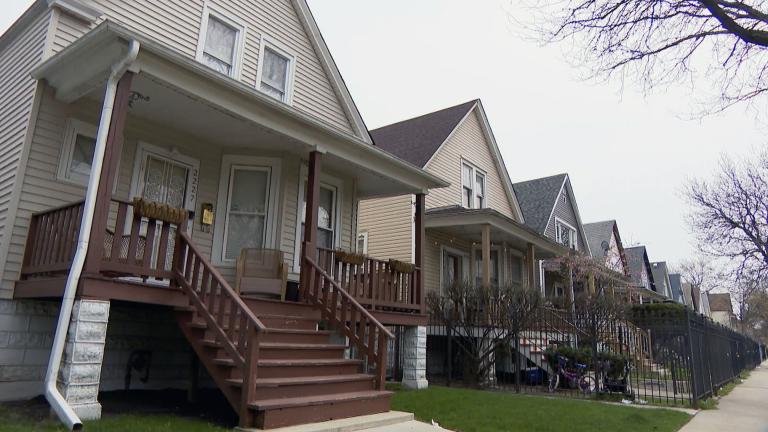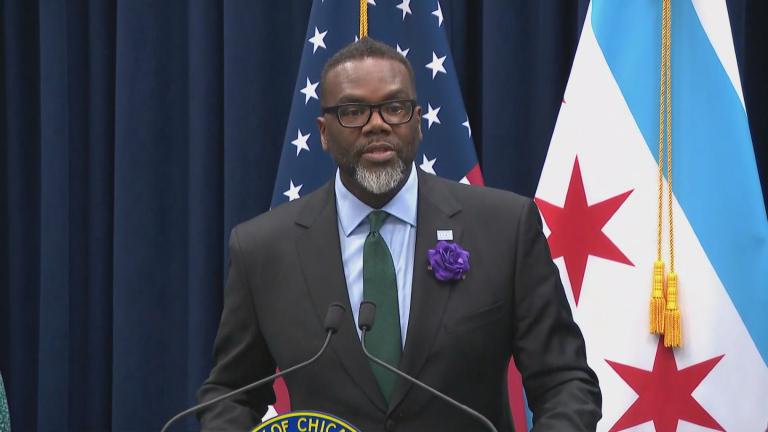Video: WTTW News Explains Chicago’s pension debt and how the city ended up owing $35.4 billion to its four employee pension funds.
Some retired police officers could see their pensions grow under a measure that cleared the General Assembly that would boost the annual cost-of-living increase added to their checks.
The bill, authored by state Sen. Rob Martwick, D-Chicago, ensures that all retired Chicago police officers get a 3% annual cost-of-living increase, regardless of whether they were born before or after Jan. 1, 1966. The Illinois House voted 94-8 to approve the bill, and the vote in the Illinois Senate was unanimous.
Martwick praised Mayor Brandon Johnson for confronting Chicago’s pension woes head-on.
“The mayor understands that fiscal responsibility starts when you identify the real costs,” Martwick said.
At an unrelated news conference, Johnson said he was committed to ensuring retirement security for Chicago police officers.
“Many people talk about how they support police officers, until it is time for them to retire,” Johnson said. “I believe that retirement security is a must.”
Even though the Policemen’s Annuity and Benefit Fund of Chicago calls for those born after that cutoff date to get annual cost-of-living increases of just 1.5%, the city frequently moved that date, and all retired officers got the 3% annual boost, avoiding conflict between the city and the Fraternal Order of Police, Lodge 7, the union that represents most rank-and-file officers.
That irregular approach benefited the city by reducing its apparent total pension bill, which is used to calculate how much the city is required to contribute to its four pension accounts annually by state law. That measure is designed to force the city’s pensions to be funded at a 90% level by 2055 as part of an effort to ensure that funds can pay benefits to employees as they retire.
That law requires Chicago to pay more than $2.41 billion to its pension funds in 2024. Johnson also proposed making an additional payment to the city’s four pension funds of $306.6 million, to prevent “further growth of the city’s unfunded pension liabilities,” according to Johnson’s office.
In April 2021, Gov. J.B. Pritzker signed a nearly identical bill boosting pensions for firefighters, over the objection of former Mayor Lori Lightfoot.
The measure approved by the Illinois General Assembly Thursday could add between $57 million and $96 million to the city’s pension bills, according to 2021 estimates.
The city’s four funds are less than 24% funded, according to the city’s 2022 Annual Comprehensive Financial Report. In all, Chicago owes $35.4 billion to its four employee pension funds representing police officers, firefighters, municipal employees and laborers, an increase of 5% from 2021, according to the report.
At Johnson’s request, Martwick and police union President John Catanzara delayed a vote on the measure in June as the mayor took office. The mayor formed a working group to tackle Chicago’s acutely underfunded pensions, but that group has yet to craft a comprehensive plan to address one of the major fiscal challenges facing the city.
In a video posted to the police union’s social media accounts, Catanzara celebrated the passage of the bill and thanked Johnson for supporting the measure.
Lawmakers did not consider a fix for the problem created by 2010 law that cut the cost of pensions offered to newly hired state and city workers as part of a pension reform plan, known as Tier II.
The working group formed by Johnson is scheduled to keep meeting, in advance of the General Assembly’s spring session, which begins in January.
Contact Heather Cherone: @HeatherCherone | (773) 569-1863 | [email protected]






